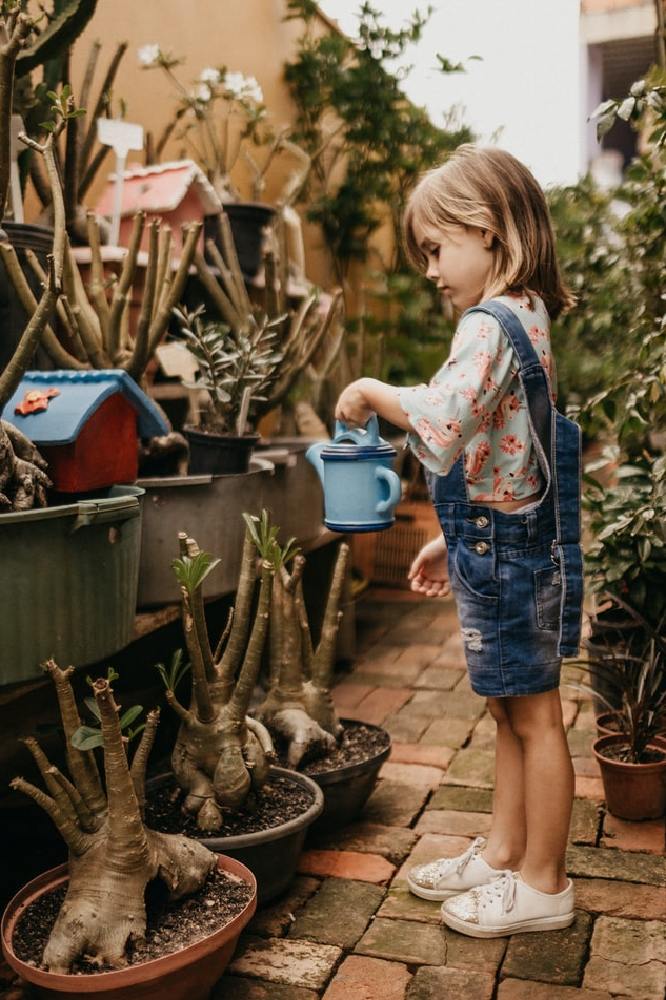By Nicola Bird, founder of The Floral Project

Image courtesy of Unsplash
Learning new skills, having fun, enjoying doing something active together - there are so many benefits to spending time with children in the garden.
And spring, with plenty of new life, sunshine, and it being the perfect season to plant flowers for summer blooms, is a great time to start.
The best thing about being in the garden with children is there are no plugs outside!
It’s a great way to encourage them to switch off from technology and engage in activities they can complete, or help to, from beginning to end - and to see how life isn’t just something to experience on a screen.
And something as simple as using a trowel to dig a hole, plant a seedling then nurture it and watch it grow brings that into focus.
For younger children, helping them get their hands into the dirt, seeing bees foraging inside a foxglove, learning why worms are so important all help to connect them to this living, breathing planet we inhabit.
There is nothing cuter than when I see a photo of a two-year-old with her grandfather sowing sweetpeas together.
What’s more, research suggests if children are involved in gardening, they perform better at school - and if they grow their own veg, it could encourage healthy eating, too.
If you’re not sure where to start, I’d recommend growing sunflowers. The larger seeds are easy for smaller hands to handle, and they are quick and easy to germinate; they can be planted into toilet rolls (which as we know are never put in the bin when you have young children!).
There’s something exciting for little ones (and us adults too) about checking the progress of their work every morning, eagerly watching as the shoots grow and finally blossom into beautiful yellows, dark red and orange colours.
Sunflowers also lend themselves well to a fun family whose-will-grow-the-tallest sunflower competition.
For little ones, the benefits of spending time in the garden with mum or dad are endless, as it’s not only a great way to connect with their caregiver, but it also develops their skills and is educational too.
For older children, being able to do something side by side with their parents lends itself to an opportunity to talk and connect.
There’s something about having a conversation without your child actually having to look at you (like those chats you only get when driving together in the car) that somehow brings a teenager out of themselves even if just for a moment or two.
I find that pricking out and potting on seedlings fully occupies their minds, which gives them a tiny break from being quite so self-absorbed and self-conscious.
In that moment, you get to see their calmness, their mental health and be reminded of who they really are - instead of the 'thing' that seems to possess them at the stroke of midnight on their 13th birthdays.
It's in moments like this that real connection happens - and connection to another person is sometimes all a child needs if they've had a hard week at school, a bout of anxiety or a friendship fallout.
That's if you can get them out from under the duvet and outside, of course - I find monetary compensation tends to do the trick rather than a promise of using up all the loo rolls!
When your garden becomes a family project, it's a wonderful feeling when you all sit down for a barbeque together and look out over all the rewards of your hard work.
Admittedly, my teenagers now do more of the sitting than the hard work, but having a beautiful garden certainly helps entice them outside - even if it's just for the sitting part!
Five things children learn by helping to grow flowers:
1. An understanding of the life-cycle of nature - from germination to flowering to going to seed to starting all over again.
2. An awe of nature - from understanding that one tiny seed has all it needs to grow a huge sunflower, to the joy of cutting flowers to give, to seeing them bloom in the garden. Our hope is a life-long passion for getting their hands dirty is born.
3. A respect for the planet - our children are far more aware than we ever were about what's happening to our planet right now. Teaching them about biodiversity, how to garden sustainably and with respect for wildlife shows them the role they can play in protecting the planet.
4. At The Floral Project - all our flowers are grown to give. We're teaching our children the joy of kindness and the thoughtfulness of doing something for another person.
5. An ability to transfer their flower-growing knowledge to growing vegetables. The more we can grow our own food, the better for the planet and our wallets right now.

Nicola Bird is the founder of The Floral Project [www.thefloralproject.co.uk] - the UK’s only subscription box that encourages people to ‘grow to give’ to others in the community or charitable causes. Each year, Nicola runs a 100 Posy Challenge where those who want to join declare their aim to donate either 10 or 100 posies throughout the summer. Her aim with the Floral Project is to eventually have 10,000 gardeners involved – and a million posies given to those that need them all across the UK.
RELATED: Parenting Life and Style: Seven jobs your toddler can help with in the garden


